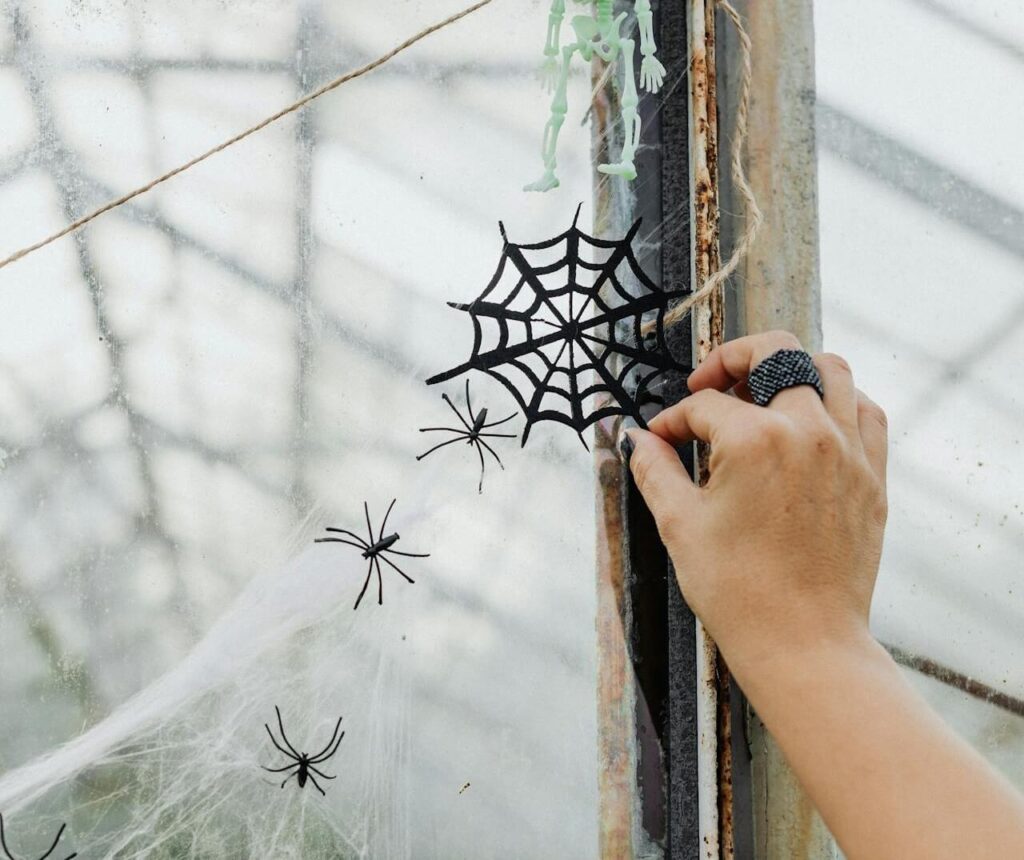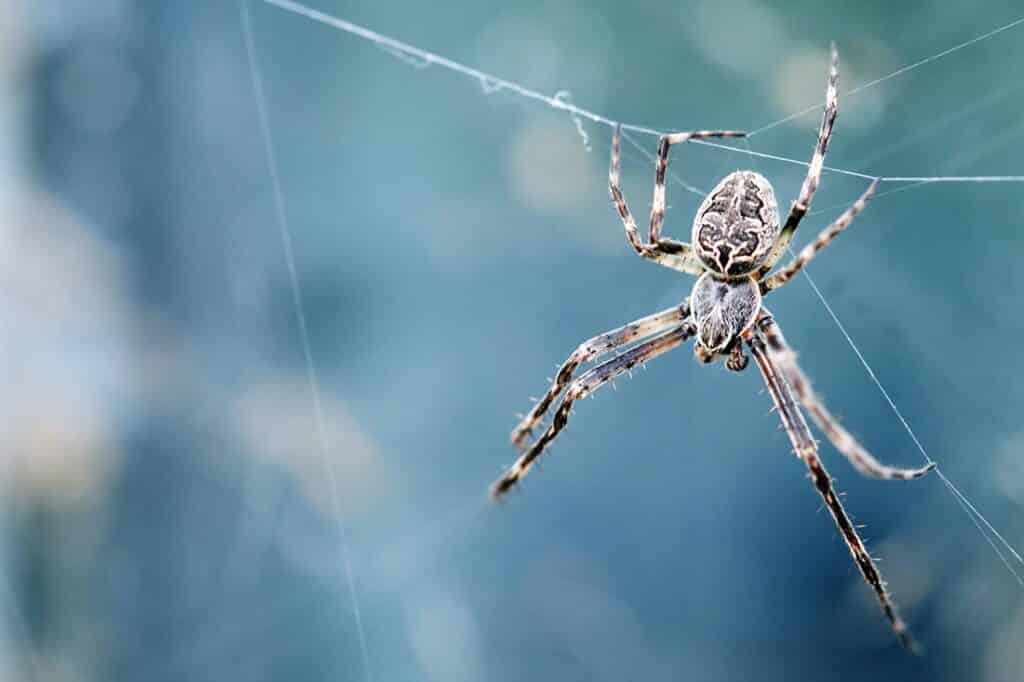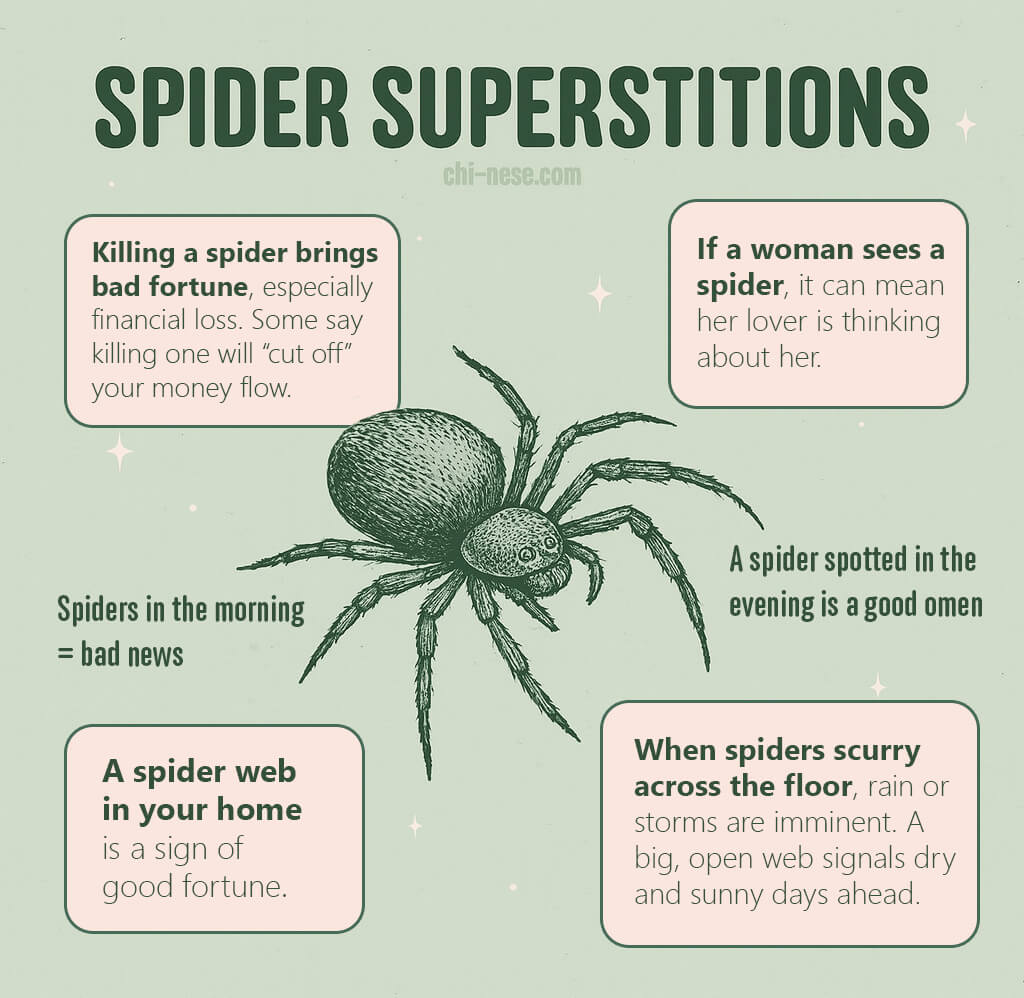Spiders have fascinated and frightened people for centuries. For some, these eight-legged creatures spark fear. For others, they are symbols of patience, prosperity, or even divine protection. My grandmother used to tell me, “Never kill a spider, it’s like throwing money out the window.” And she wasn’t the only one. Across the world, countless cultures have their own spider superstitions, ranging from symbols of fortune to ominous warnings.
Are spiders really messengers of luck? Or are they omens of trouble? Let’s explore 21 of the most enduring spider superstitions and what they mean.
Spiders as Symbols of Wealth and Prosperity

The “Money Spider”
In British and European folklore, tiny spiders are often called “money spiders.” If one crawls on you, it’s believed to mean you’ll come into wealth or receive money soon. Some people even say that the direction the spider crawls predicts whether money is coming in or going out. Many grew up being told not to brush them away because they were “spinning” your fortune right onto you.
Web of Fortune
A spider web in your home isn’t always a nuisance. In fact, many traditions see it as a sign of good fortune. A web is a spider’s creation, and its persistence in weaving is admired as a symbol of wealth-building. Some households believe that leaving spider webs untouched invites continuous prosperity into the home. The spider is seen almost like a tiny banker, weaving security and abundance right above your head.
Evening Spiders Bring Wealth
In old English sayings, a spider spotted in the evening is a good omen, believed to bring wealth or joy. Morning spiders, by contrast, were sometimes seen as bad luck. The rhyme went: “If you wish to live and thrive, let the spider run alive. See a spider in the morning = sorrow; at noon = worry; in the evening = joy.” Evening spiders are the ones to look out for if you’re hoping for financial luck.
Don’t Kill Spiders, You’ll Lose Money
Many cultures share the belief that killing a spider brings bad fortune, especially financial loss. Some say killing one will “cut off” your money flow. This superstition may come from the idea that spiders eat harmful pests, helping crops and homes thrive. By destroying them, you symbolically destroy abundance.
Spiders on Clothing Bring Riches
If a spider lands on your clothes, don’t panic… it’s often considered a sign that wealth or good fortune is coming your way. In some traditions, a spider weaving a thread on your clothing means money is “clinging” to you. A small spider walking across your shirt might be delivering your next lucky break.
Spiders as Weather Omens

Large Webs Predict Good Weather
Farmers once relied on spiders to predict weather. A big, open web built outdoors was thought to signal dry and sunny days ahead. The reasoning was that spiders only risked building wide, exposed webs if the weather would hold steady. Seeing such a web was a comforting sign that storms weren’t on the horizon.
Small Webs Signal Rain
On the flip side, smaller or tightly built webs were thought to mean rain was coming. Spiders supposedly built close-knit webs to protect themselves from moisture. For agricultural communities, these webs were like natural barometers.
Spiders Running Indoors Mean Rain
Across parts of Europe, it was believed that when spiders scurried across the floor, rain or storms were imminent. The logic? Spiders, sensing the change in air pressure, retreated indoors for safety. Their movement became a sign that humans should also prepare for wet weather.
Spiders and Visitors or Messages

A Spider Dangling in Front of You
One of the most enduring superstitions says that if a spider dangles directly in front of you from its thread, it predicts a visitor. The arrival could be a friend, a relative, or even unexpected company. Some old households saw it as a positive omen, a sign of social connection and news coming your way.
Spiders as Messengers of Love
In certain traditions, a dangling spider was believed to bring news from a loved one. If you were waiting to hear from a partner far away, a spider descending before your eyes could be a reminder that they were thinking of you. Spiders, with their web of connections, were thought to carry messages along invisible threads.
Spiders in the Morning = Bad News
Old English folklore warns against morning spiders. Seeing one early in the day was said to bring sorrow or disappointment. By noon, spotting a spider meant worry, but by evening, it promised joy or incoming fortune. People treated their daily spider sightings as miniature horoscopes.
Spiders in Love and Marriage Superstitions

A Spider on Your Wedding Dress
One of the luckiest omens in marriage lore is finding a spider on your wedding gown. Rather than a pest, it’s believed to bless the bride with happiness, fertility, and prosperity. Some brides even welcomed small spiders on their dresses, seeing them as living good luck charms.
Spiders and Romance
European folklore holds that if a woman sees a spider, it can mean her lover is thinking about her. The spider becomes a symbol of romantic connection, an eight-legged reminder that someone far away holds her in mind.
A Spider in the Bedroom
Superstitions from some regions claim that finding a spider in your bedroom is linked to fertility or strong romantic bonds. The creature’s presence was thought to encourage harmony between lovers and even increase chances of conception.
Spiders as Protectors and Guardians

Home Guardians
Many cultures see spiders as protectors of the home. Beyond their practical role in eating pests, they’re thought to spin energetic “shields” with their webs. A spider near your window or doorway might be seen as standing guard, filtering out bad luck or negative spirits.
Spiritual Guides
In Native American traditions, the spider often represents wisdom and guidance. The Hopi and Pueblo tribes tell stories of Spider Grandmother, a spiritual figure who wove the world into existence and continues to protect humanity. Spiders are thus not pests, but wise teachers.
Spiders and Protection from Evil
In African folklore, spiders are sometimes believed to ward off evil when they spin webs near entryways. The Anansi tales from West Africa also celebrate the spider as a clever, protective trickster who defeats stronger enemies with wit.
Spiders and Creativity or Destiny

Inspiration from Web-Building
A spider’s web is one of nature’s most intricate designs, and many superstitions see it as a source of inspiration. People have long believed that seeing a spider at work can encourage you to stay determined and patient. Each thread reminds us that small, consistent actions lead to bigger achievements.
Dreaming of Spiders
In many cultures, dreaming of a spider means creative energy, feminine power, or destiny at work. Just like spiders weave webs, the dreamer is encouraged to weave their own path or project into being.
Robert the Bruce’s Spider
The famous Scottish king Robert the Bruce reportedly found hope while hiding in a cave during war. Watching a spider try again and again to spin its web, Bruce was inspired not to give up his fight for freedom. This story turned the spider into a symbol of persistence, resilience, and eventual victory: qualities many cultures still admire.
Spiders as Omens of Death or Danger

Black Spiders as Bad Luck
Not all spider superstitions are positive. In some traditions, black or unusually large spiders are linked with bad luck, death, or misfortune. While many small spiders bring wealth, the darker ones were feared. They symbolized hidden threats, reminding people that not all omens are friendly.
Do Spiders Really Bring Good Luck?
Superstitions are called “super” for a reason. There’s no scientific proof behind them, yet across thousands of years people noticed patterns: spiders appearing before weather changes, visitors showing up, marriages blessed, or money finding its way in.
So, do spiders bring good luck? According to superstition, yes. They’ve long been seen as symbols of patience, hard work, and creativity: qualities that naturally draw success. For many, they’re also guardians that keep negativity away or messengers that signal change is coming.
As my grandmother used to say: “Don’t kill a spider. It’s working hard, just like you. And sometimes, it’s weaving luck right into your life.”
Whether you view them as protectors, omens, or simply fascinating little creatures, spiders continue to hold a powerful place in human imagination and folklore.












